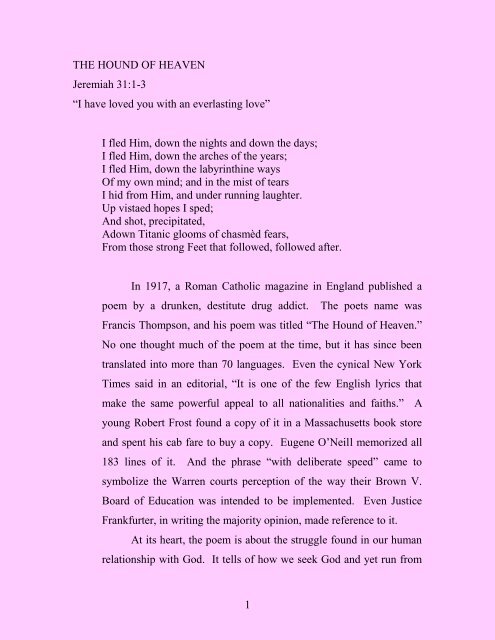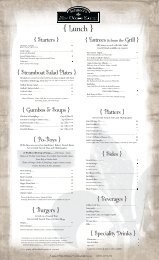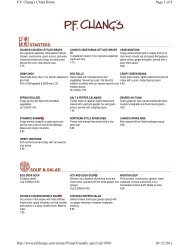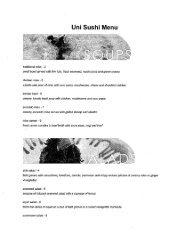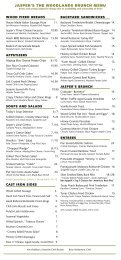THE HOUND OF HEAVEN - Woodlands Online
THE HOUND OF HEAVEN - Woodlands Online
THE HOUND OF HEAVEN - Woodlands Online
- No tags were found...
Create successful ePaper yourself
Turn your PDF publications into a flip-book with our unique Google optimized e-Paper software.
<strong>THE</strong> <strong>HOUND</strong> <strong>OF</strong> <strong>HEAVEN</strong><br />
Jeremiah 31:1-3<br />
“I have loved you with an everlasting love”<br />
I fled Him, down the nights and down the days;<br />
I fled Him, down the arches of the years;<br />
I fled Him, down the labyrinthine ways<br />
Of my own mind; and in the mist of tears<br />
I hid from Him, and under running laughter.<br />
Up vistaed hopes I sped;<br />
And shot, precipitated,<br />
Adown Titanic glooms of chasmèd fears,<br />
From those strong Feet that followed, followed after.<br />
In 1917, a Roman Catholic magazine in England published a<br />
poem by a drunken, destitute drug addict. The poets name was<br />
Francis Thompson, and his poem was titled “The Hound of Heaven.”<br />
No one thought much of the poem at the time, but it has since been<br />
translated into more than 70 languages. Even the cynical New York<br />
Times said in an editorial, “It is one of the few English lyrics that<br />
make the same powerful appeal to all nationalities and faiths.” A<br />
young Robert Frost found a copy of it in a Massachusetts book store<br />
and spent his cab fare to buy a copy. Eugene O’Neill memorized all<br />
183 lines of it. And the phrase “with deliberate speed” came to<br />
symbolize the Warren courts perception of the way their Brown V.<br />
Board of Education was intended to be implemented. Even Justice<br />
Frankfurter, in writing the majority opinion, made reference to it.<br />
At its heart, the poem is about the struggle found in our human<br />
relationship with God. It tells of how we seek God and yet run from<br />
1
Him at the same time. It also tells of God’s pursuit of us and His final<br />
capturing of the human soul. All of this is the essence of scripture, the<br />
entirety of the Bible captured into this one poem. Among the first<br />
pages of scripture, God asks, “Where art thou” Then on its final<br />
page is found, “The Spirit and the bide say, Come. And let him that<br />
hears say, Come. And let him that is thirsty come.” The Bible is the<br />
story of a search.<br />
More often than not, when we speak of searching it is from our<br />
standpoint – our need to find God as though He were the one lost. Yet<br />
there is truth in this, because the history of humanity is one of<br />
searching for the Living God.<br />
Plato said that in the beginning man and woman were one<br />
person, then when they became separated love became an appetite and<br />
a restless hunger urging them to be reunited. Just so, at the heart of<br />
every human being is an unnamed hunger to be at one again with his<br />
or her Creator – with God.<br />
The search for beauty is the search for God, as is the search for<br />
truth. Some find God through suffering, or torment – inner emptiness,<br />
or in times of deep need. Many have found Him through music, while<br />
others have come to Him through nature. St. Ignatius said that he<br />
found God while sitting by a stream. Billy Sunday proclaimed, “I<br />
stumbled drunk into the Great Arms.” George Henry Luce wrote,<br />
“The history of philosophy is the history of man’s long quest for<br />
God.”<br />
The greater reality though, is the Divine’s unrelenting quest for<br />
man. It is Adam hiding from Him among the trees, Jacob wrestling<br />
Him to the point of exhaustion, and Jonah running the other way. It is<br />
2
God’s relentless love for David in spite of the adultery, murder, and<br />
hypocrisy which David did in return. Yet when David finally did<br />
pray, “Cast me not from your presence, and take not your holy spirit<br />
from me. Restore unto me the joy of thy salvation…” David was<br />
given another chance – not only did God forgive him, but He also<br />
restored Him to the point where David preaches from every pulpit,<br />
sings from every song book, and his psalms are the pillow of comfort<br />
beneath the head of the dying.<br />
Peter ran from God. The honors, the distinctions, the special<br />
instructions that Christ gave to him were repaid with a huge denial<br />
that the two of them had ever met – let alone being a follower. But<br />
God kept reaching and searching and called him back to feed His<br />
flock and to become a great leader of His church. God made of him a<br />
true rock – no longer in name only, but in deed and in character as<br />
well.<br />
John Mark lost all heart to continue with Paul and Barnabas on<br />
their journey when the way became rough. So much so that Paul lost<br />
all confidence in John Mark and when leaving on their next journey<br />
did not want him to come along because he was too unreliable – just<br />
could not believe that he would finish what he started. But he<br />
repented of his cowardice and weakness, was given another chance,<br />
and proved himself a useful and faithful tool for Christ. In one of the<br />
last messages we have from Paul, written from his prison in Rome, he<br />
asks Timothy to bring Mark with him, because Mark was a very<br />
useful and necessary piece of his ministry.<br />
St. Augustine ran hard to get away from God. At age 16 he left<br />
home and plunged into the abyss of a cesspool in which he continued<br />
3
to wallow to the age of 31. God did not let him go and kept tugging at<br />
him through his mother Monica. Finally God brought Augustine to<br />
know Ambrose, the Bishop of Milan. The rest is history – the long<br />
struggle concluded and Augustine knelt at the foot of the Cross as one<br />
who was to do great things for Christ and His Kingdom.<br />
These are still accurate pictures of our restless generation. “I<br />
fled Him down the labyrinthine ways…down the nights and down the<br />
days…with desperate haste, deliberate speed.” The real truth about<br />
us, the real secret of our feelings, the true tempo of our culture, the<br />
tragedy of our life, is that we are not really attempting to find, but<br />
rather to flee – to get away, to hide from the eyes of the Holy One.<br />
But we can never escape the inescapable.<br />
Always on the same path as we are on there is the sound of<br />
strong feet following after us. You can name His footsteps in your<br />
own life – just as I can name them in mine. One of them is memory –<br />
deep down memory – half hidden and half forgotten, yet remembering<br />
a time when we were “made a little less than God.” Can that really<br />
ever be forgotten – totally Macneile Dixon said that this is what the<br />
fine arts are about at their heart. Music, poetry, painting are all<br />
humanities attempts to find and recapture this old ideal, like some<br />
lost chord, an attempt to put together that perfect combination of keys<br />
on the piano.<br />
Much is being said today about the rise of secular humanism<br />
and the abandonment of old, out-dated beliefs. But those beliefs have<br />
not abandoned us. They continue to lie buried in our minds and hearts<br />
like a dream which awakens at unexpected moments. I have always<br />
enjoyed the old Russian fable about a school girl who was raised as an<br />
4
atheist. One of the questions on a test she was taking read: “What is<br />
the inscription on the Sarmian Wall” She wrote: “Religion is the<br />
opiate of the people.” However, being unsure of her answer, she went<br />
to the wall following school to look and see if she was right. There<br />
she found the inscription: “Religion is the opiate of the people.”<br />
Turning to go home she sighed, “Thank God, I got it right.” Even<br />
under the frozen mind of human denial there stirs the memory – half<br />
hidden, half remembered. Even when suppressed by the world –<br />
governments, cultures, mores of the times – Strong Feet will continue<br />
to follow after us.<br />
The absence of God and the emptiness of life are complaints<br />
which we hear all around today. “Jesus makes life full” we say. “I<br />
came that my joy may be in you and that your joy may be made full”<br />
we quote. “We need to bring God back into our lives” we preach.<br />
We are on a search, a quest to fill that void which we can never truly<br />
identify or name.<br />
But what if the truth of it is the other way around What if<br />
everything which we interpret as being a sign of Divine absence is<br />
actually a sign of God’s presence What is a sense of guilt but proof<br />
that we are His children What if misery is the surest sign of hope<br />
What if sadness is really an invitation home Or if discouragement<br />
and disillusion say that God is still in our heart “Thou hast made us<br />
for Thyself, O God, and restless are our hearts until they rest in Thee”<br />
St. Augustine prayed.<br />
Have you ever considered that God just might pursue us the<br />
strongest through heresy – those brilliant arguments which seek to<br />
convince that God does not exist just might be the surest proof we<br />
5
have of His very existence. Question: Why is so much contemporary<br />
media filled with God talk Why are so many people preoccupied<br />
with the tragic side of life, the victimization of men and women and<br />
children, the revolt against religion and the cutting out of God from<br />
culture So much is being written and said about religion being<br />
finished. If that is true, then why not drop the subject If God is dead<br />
then why keep talking about Him Why all the talk about God by<br />
people who say they do not believe in Him<br />
One of the most brilliant atheists of the 20 th century was Jean<br />
Paul Sartre. Why was he so preoccupied with God He said that<br />
humanity must forget God, give up the search for God, and then –<br />
then page after page of his writings are filled with his search for<br />
meaning, shaking his fist at the sky and justifying his case against the<br />
Almighty. “We must forget God” he said, and yet God haunted him<br />
and hunted him all of his days. Sartre believed that he was finished<br />
with God, but God was not finished with him. Martin Luther<br />
understood this ambivalence well, “Nobody in this life is nearer to<br />
God than those who deny Him. He has no children more dear to Him<br />
than those like Job and Jacob who wrestle with him and cannot let<br />
Him go.”<br />
Herein lies the truth of it: we try to get away, to run and to hide,<br />
but we cannot. Take the wings of the morning and fly to the ends of<br />
the earth – and He is there. Make your bed in hell – the hell of<br />
stupidity, the hell of sorrow, the hell of pain – and He is there.<br />
Something greater than ourselves is coming after us, and because the<br />
world is round we have nowhere to hide. Because His love is great,<br />
6
he will not let us get away. His goodness and mercy have followed us<br />
all the days of our lives.<br />
The old time preachers and theologians had a phrase for this –<br />
prevenient grace. It means that God has been on this road of life long<br />
before we were and He is calling us to journey forward, holding us,<br />
guiding us, catching us, making the crooked a little straighter and the<br />
obstacles a little smoother; and that we look for Him on this road of<br />
ours and seek Him to help us only because He reached out to us first.<br />
He is the seeker and we are the sought – how else do you explain the<br />
Cross<br />
He is calling your name. Do you believe that He is distant or<br />
absent, hard to find and hiding Or are you hiding from Him<br />
Whom wilt thou find to love ignoble thee,<br />
Save Me, save only Me <br />
All which I took from thee I did but take,<br />
Not for thy harms,<br />
But just that thou might'st seek it in My arms.<br />
All which thy child's mistake<br />
Fancies as lost, I have stored for thee at home :<br />
Rise, clasp My hand, and come !"<br />
Halts by me that footfall :<br />
Is my gloom, after all,<br />
Shade of His hand, outstretched caressingly <br />
"Ah, fondest, blindest, weakest,<br />
I am He Whom thou seekest !<br />
Thou dravest love from thee, who dravest me."<br />
Amen.<br />
7


